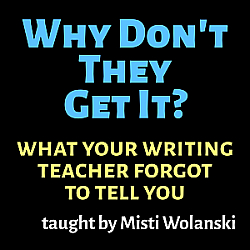I’ve spoken before about the different types of editors. Each type of editor and/or editing pass helps us strengthen a different aspect of our work: the storytelling, the writing itself, and the grammar of our sentences.
As a developmental editor, I focus a lot on the storytelling aspect of writing craft in my posts here: character arcs, plots and subplots, stakes and motivations, etc. But any peek at Amazon reviews reveals that the common “needs editing” complaint usually refers to copyediting.
That is, complaints about editing quality from readers usually focus on grammar and word choice and usage. (In contrast, storytelling issues are usually revealed through complaints about characters and plot holes, and writing issues are usually called out with complaints about voice, clarity, or “weak writing.”)
That copyediting-style focus makes sense. Most of us think we learned the basic rules of grammar and mechanics in school, so that’s the level of editing most of our readers feel qualified to judge and call out as bad editing.
That potential of being called out in reviews is just one reason why copyediting is so important. The changes copyeditors make often seem small, but they add up over a story’s pages, and sometimes the wrong usage of a word or punctuation mark can change the meaning of our writing.
Today, my friend—and one of my copyeditors—Misti Wolanski (also known as Carradee) is here to help me out while I’m still struggling with vision issues. (My doctor initially misdiagnosed the problem, but I’m hopeful the follow-up tests this week nailed down the problem—and the fix.) Thank you, Misti!
For an in-depth look at how some of the smallest words can have a big impact on how readers interpret our work, please welcome Misti Wolanski! *smile*
*****
Do You Need “a” Word or “the” Word?
Let’s say you’re writing something—a blog post, a story, a comment somewhere—and you start out with, “The problem is that nobody listens.” Solid sentence, right. You have a subject, verb, dependent clause…
But which nobody are you talking about? Nobody in a particular place? Nobody in a particular demographic?
And what, exactly, is nobody not listening to?
So you revise your sentence to be more clear, and you say, “The problem is that people listen to what they think you’re saying rather than what you’re actually saying.”
That works, but… The problem with what?
And is that issue with listening really the only problem with it?
“Of course poor listening skills isn’t the only reason people misunderstand each other!” you might respond. “I didn’t say it was!”
Ah, but you did indicate it’s the only problem.
How?
You said “the problem”. If you meant that it’s only one of the problems, you should’ve said “a problem” or “one problem”.
(And you have to make sure the context—reasons people misunderstand each other—is on the page, too. Otherwise, you’re saying that folks’ failure to listen is at the root of everything in general.)
Why does such a little word matter?
How “A” and “The” Differ
To explain, let’s back up and look at what “the” and “a” (and “an”) are.
- the = definite article, which means it refers to something definite: a single and specific item that has already been defined.
- a (also an) = indefinite article, which means it refers to something indefinite: a single yet unspecific item that has not already been defined.
It’s the difference between “the house at the end of the street” and “a house at the end of the street”. “The house” refers to a specific house at the end of a specific street, whereas “a house” refers to some house at the end of a specific street, and which house either doesn’t matter or isn’t known.
“Which word do I use?” depends what is defined in context.
In nonfiction, much of that context is your audience. For example, I haven’t defined what an article is, in context, because it doesn’t matter here and I know y’all know how to look that up if you want to.
In fiction, much of that context is your point of view. Does the point of view have a particular defined item in mind, or is it just a random one.
Possessive Pronouns: Other Little Words That Matter
There’s also another word that changes your meaning, and that’s the possessive pronoun, like “his” and “her” and “its”. These possessives narrow your context to a specific defined item that derives from whatever or whoever the pronoun’s referring to.
Dense, right?
This is one of those things that makes a lot more sense once you see some examples:
- “I grabbed the basket from the table.”
There’s one table, and it has one basket on it. I grabbed that specific basket.
- “I grabbed a basket from the table.”
There’s one table, and it has multiple baskets on it. I grabbed a basket at random; it doesn’t matter which.
- “I grabbed his basket from a table.”
This has two possible meanings, and the context will determine which is meant:
- “He” (whoever “he” is) has one basket, and it just so happened to be on a table when I found and grabbed it—it could’ve easily been on the floor or chair or elsewhere.
- There are multiple tables, and each one has a basket belonging to “him” on it. I grabbed one of his baskets, but it doesn’t matter off which table.
Which Word Should We Use?
Now, what if you’re in a situation where you aren’t sure if you should or can use “a” or “the”?
First, look where you are in the context. Unless you’ve already defined a specific item under discussion, “the” will often be innately unclear. (The main exception: comments on forums and blogs that refer to an opening post, but whatever your comment’s referring to needs to be clear.)
For example, “I went to the store” means…what, exactly? Which store? But if it’s an answer to “We need groceries” or “Do we have groceries?”, then “the store” would probably be wherever the speakers usually go for groceries. (Note that someone can use this to lie without explicitly lying.)
Second, what happens if you say “one” of whatever it is? Does that keep your meaning? Or do you need to say “this”?
- If “one” keeps your meaning, then you need to use “a” instead of “the”.
- If “this” keeps your meaning, then you need to use “the” instead of “a”.
To illustrate this tip, let’s hop back to our original example and that sentence that’s supposed to start a piece of nonfiction:
- “This problem (that causes misunderstandings) is that people tend to listen to what they think you’re saying rather than what you’re actually saying.”
Huh? That doesn’t work as an opening. Maybe if you added a definition before it, like “There is a problem that is central to many misunderstandings”—that would’ve worked. But just standing out on its lonesome like that? Nope, so I can’t use “the” here unless I add something before it to define what I’m talking about.
- “One problem (that causes misunderstandings) is that people tend to listen to what they think you’re saying rather than what you’re actually saying.”
Oh, that works, so I can use “a” if I want.
What does this matter?
Do These Little Words Actually Matter?
Ignoring the difference between “a” and “the” is a quick and easy way to contradict yourself and confuse your reader. By the same token, you also have to make sure you use the right possessive pronoun for what you meant to say.
Let’s say you are talking about your sibling’s ex-boyfriend.
- “Oh, I went to his house” = “Oh, I went to the house of my sibling’s ex-boyfriend.”
- “Oh, I went to the house” = “Oh, I went to whatever house is being spoken about at the moment” (or “Oh, I went to a particular house (and I want you to think it was whatever house is being spoken about at the moment)”).
- “Oh, I went to a house” = “Oh, I went to a random house”—which is a completely new topic altogether.
And that’s why these littlest words matter so much.
*****
 Most teachers assume their students already know these sorts of details—details that most people can learn, if someone bothers to point them out, but that most people just don’t think to. It doesn’t help that these things tend to feel obvious once you know them. Every realm of expertise has these kinds of details, information that is skipped or forgotten by the experts when they’re telling newbies.
Most teachers assume their students already know these sorts of details—details that most people can learn, if someone bothers to point them out, but that most people just don’t think to. It doesn’t help that these things tend to feel obvious once you know them. Every realm of expertise has these kinds of details, information that is skipped or forgotten by the experts when they’re telling newbies.
For years, I’ve tutored clients one-on-one, but teaching one-on-one has its limits. It also tends to make folks feel like the worst writers in the world (even though they most certainly aren’t), which only makes it harder for them to learn. A group environment would be so much better for morale and learning overall.
That’s why I’m starting my group class! Why Don’t They Get It: what your writing teacher forgot to tell you will cover all sorts of foundations like that pronoun thing, and not all of them are related to grammar.
To get foundational concepts and news when things open next week, you can sign up here. If you want a bit more information about the premise behind the class, check out the class page on my website.
*****
 Misti Wolanski lives somewhere on planet Earth with a cat. When she isn’t reading, writing, or editing, she’s probably listening to song covers on YouTube, troubleshooting website code, or inventing a new recipe without any of the myriad ingredients she’s allergic to.
Misti Wolanski lives somewhere on planet Earth with a cat. When she isn’t reading, writing, or editing, she’s probably listening to song covers on YouTube, troubleshooting website code, or inventing a new recipe without any of the myriad ingredients she’s allergic to.
She enjoys bridging the gaps between newbies and experts to help others accomplish their goals, be it by teaching them how to write better or showing them how to make a tincture. Find her at her website.
*****
Thank you, Misti! Many of us might never have thought how much little words could affect our readers’ understanding (and how much this matters for our characters’ point of view as well). As you said, every area of expertise has details that are considered so basic that experts forget to mention them.
Sometimes as newbies, we might not know those basics, or we might vaguely know them but not understand how or why they’re important. That’s why even things that experts might assume we know should be explicitly taught. Thanks for adding to our knowledge base, Misti! *smile*
Have you ever wondered why these little words matter or how we can know which one to use? Has an editor ever found errors along these lines in your work? Have you ever been faced with an expert who couldn’t start with the basics when teaching? Do you have any questions for Misti?

